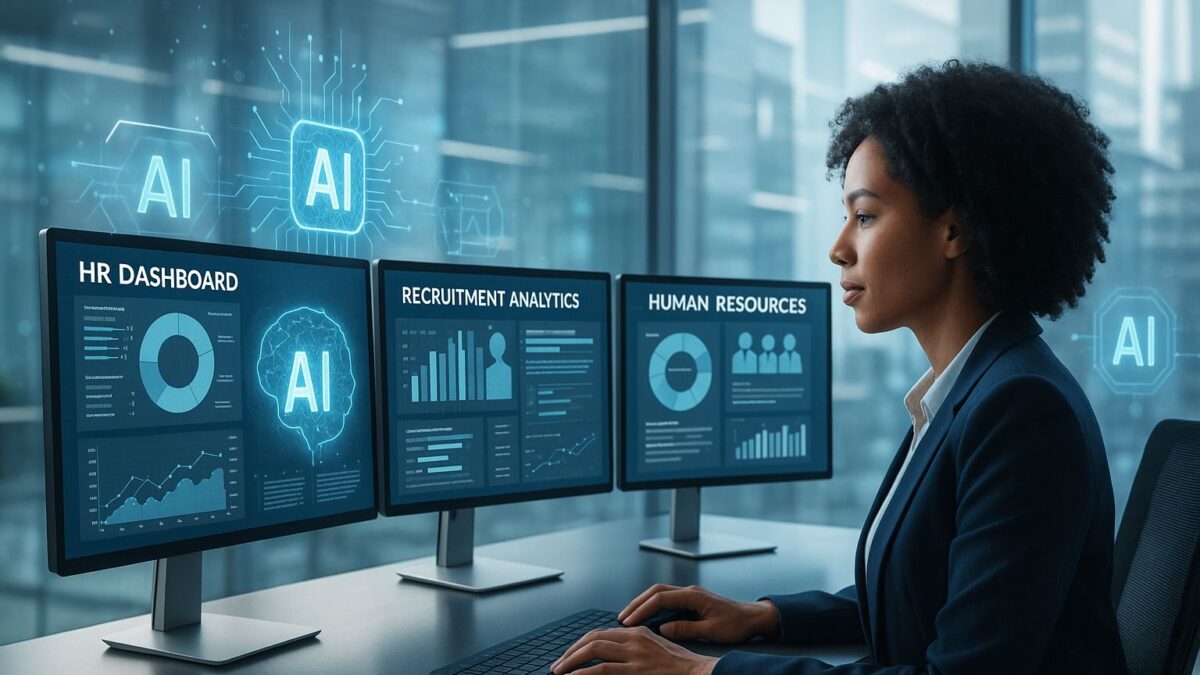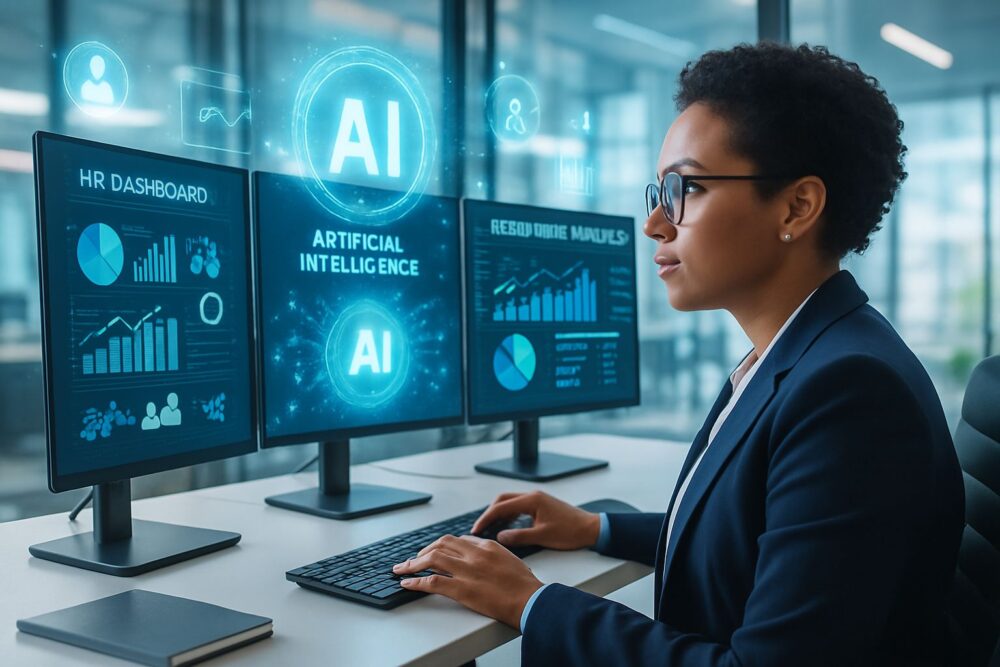AI in HR Training 2025: The human resources landscape is undergoing a revolutionary transformation as artificial intelligence reshapes how organizations approach talent management, employee development, and workforce optimization. Understanding and implementing AI in HR training 2025 has become essential for HR professionals seeking to remain competitive and deliver exceptional value to their organizations.
As we advance through 2025, the integration of AI technologies in HR functions has moved from experimental initiatives to mission-critical capabilities that determine organizational success. HR teams that embrace AI-powered tools and methodologies consistently outperform those relying on traditional approaches, achieving better hiring outcomes, improved employee engagement, and enhanced operational efficiency.
The complexity of modern workforce management requires sophisticated tools and strategic thinking that only AI-enhanced HR professionals can provide. This reality makes comprehensive AI training not just beneficial but absolutely necessary for career advancement and professional relevance in today’s competitive job market.
AI in HR Training 2025: The Evolution of HR Technology and AI Integration
AI in HR Training 2025: Traditional HR practices built around manual processes, intuition-based decision making, and reactive approaches are rapidly becoming obsolete. Modern organizations require HR professionals who can leverage AI technologies to make data-driven decisions, predict workforce trends, and optimize human capital investments. The workplace.
AI in HR training 2025 encompasses multiple technological domains including machine learning algorithms for talent acquisition, natural language processing for employee feedback analysis, predictive analytics for retention modeling, and automated systems for performance management. These technologies work together to create comprehensive HR ecosystems that deliver superior outcomes.
The most successful HR transformations combine technological capability with human insight, creating hybrid approaches that leverage AI efficiency while maintaining the personal touch that employees value. This balance requires specialized training that helps HR professionals understand both technical capabilities and human psychology.
Current AI Applications in HR
AI in HR Training 2025: Recruitment and talent acquisition have been revolutionized by AI algorithms that can screen thousands of resumes, identify top candidates, and predict job performance with remarkable accuracy. These systems analyze not just qualifications and experience, but also communication patterns, cultural fit indicators, and long-term potential.
Employee engagement measurement now utilizes sentiment analysis, communication pattern recognition, and behavioral prediction models that provide real-time insights into workforce satisfaction and productivity. These tools enable proactive intervention before issues escalate to costly turnover or performance problems.
Performance management systems powered by AI can track productivity metrics, identify development opportunities, and recommend personalized career paths for individual employees. This level of customization was impossible with traditional HR approaches but has become standard expectation in modern organizations.
Core Components of AI HR Training Programs
Technical Skills Development
AI in HR Training 2025: Effective AI in HR training 2025 begins with fundamental understanding of how AI technologies work, their capabilities and limitations, and practical applications in HR contexts. HR professionals need not become programmers, but they must understand enough about AI to make informed decisions about tool selection and implementation. AI courses for HR professionals.
Data literacy has become essential, as AI systems require high-quality data to function effectively. HR professionals must learn to identify relevant data sources, ensure data quality, and interpret AI-generated insights accurately. This includes understanding statistical concepts, recognizing bias in data sets, and maintaining data privacy compliance.
Platform proficiency across major HR AI tools enables practical application of training concepts. Leading platforms like Workday, BambooHR, and specialized AI recruitment tools each have unique interfaces and capabilities that require hands-on experience to master effectively.
Strategic Implementation Planning
AI technology deployment requires careful planning that considers organizational culture, existing systems, and change management requirements. Training programs must cover project management methodologies, stakeholder engagement strategies, and risk mitigation approaches specific to AI implementations.
ROI measurement for AI initiatives requires understanding both quantitative metrics like cost reduction and time savings, and qualitative benefits like improved employee satisfaction and enhanced decision-making quality. HR professionals need frameworks for demonstrating AI value to executive leadership and securing ongoing investment.
Change management becomes critical when introducing AI tools that may create anxiety among employees concerned about job displacement or increased surveillance. Training must address communication strategies, resistance management, and cultural transformation approaches.
Practical Applications and Use Cases
Recruitment and Talent Acquisition
AI-powered recruitment tools can reduce time-to-hire by 50-70% while improving candidate quality and diversity outcomes. These systems analyze job descriptions, identify optimal posting channels, screen applications automatically, and schedule interviews efficiently.
Bias reduction in hiring represents one of AI’s most valuable contributions to HR. Properly configured AI systems can eliminate unconscious bias related to gender, ethnicity, age, and other protected characteristics while focusing purely on job-relevant qualifications and potential.
Candidate experience enhancement through AI includes personalized communication, automated status updates, and intelligent matching that connects candidates with opportunities aligned to their career goals even when initial applications don’t succeed.
Employee Development and Performance Management
Personalized learning recommendations powered by AI analyze individual learning styles, career goals, and skill gaps to suggest optimal development opportunities. These systems can identify when employees are ready for advancement, recommend specific training programs, and predict success rates for different development paths.
Performance prediction models help identify high-potential employees, those at risk of leaving, and individuals who might benefit from additional support or different role assignments. This predictive capability enables proactive management that improves retention and productivity.
Career pathing algorithms can analyze organizational structure, skill requirements, and individual capabilities to recommend optimal career progression routes. This guidance helps employees make informed decisions about their professional development while ensuring organizations develop necessary talent pipelines.
Employee Engagement and Retention
Sentiment analysis of employee communications, survey responses, and behavioral patterns provides real-time insights into workforce satisfaction levels. AI in HR training 2025 includes learning to interpret these insights and develop appropriate intervention strategies.
Predictive retention modeling identifies employees at risk of leaving before they submit resignations, enabling proactive retention efforts. These models consider factors like compensation satisfaction, career progression, workload management, and external market opportunities.
Automated feedback collection and analysis systems can process thousands of employee comments, identify trending concerns, and generate actionable recommendations for management. This capability transforms employee feedback from periodic surveys into continuous organizational intelligence.
Advanced AI Training Modules
Ethics and Compliance in AI HR
AI in HR Training 2025: Understanding legal and ethical implications of AI in HR remains crucial as regulations evolve. AI in corporate learning. Training must cover privacy protection, algorithmic transparency, discrimination prevention, and compliance with emerging AI governance frameworks. key predictions for 2025 AI
Bias detection and mitigation requires understanding how AI systems can perpetuate or amplify existing biases and implementing safeguards to ensure fair treatment of all employees. This includes regular algorithm auditing and adjustment procedures.
Emerging Technologies and Future Trends
Natural language processing applications in HR continue expanding, enabling more sophisticated analysis of employee communications, automated policy explanations, and intelligent chatbots for HR service delivery.
Predictive workforce planning using AI can forecast future talent needs, identify skill gaps, and recommend proactive recruitment or development strategies. These capabilities become increasingly valuable as organizations navigate rapid technological and market changes.
Integration with other business systems enables AI HR tools to access broader organizational data, providing more comprehensive insights into workforce optimization opportunities and business impact measurement.
Implementation Strategies for Organizations
Building Internal AI Capabilities
AI in HR Training 2025: Organizations pursuing AI in HR training 2025 should develop internal centers of excellence that combine HR expertise with technical knowledge. These teams can evaluate new technologies, manage implementations, and provide ongoing support for AI initiatives.
Partnership strategies with technology vendors, training providers, and consulting firms can accelerate AI adoption while building internal capabilities. The key lies in selecting partners who understand both HR challenges and AI solutions.
Measuring Training Effectiveness
AI in HR Training 2025: Success metrics for AI HR training should include both skill development indicators and business impact measures. Tracking improvements in recruitment efficiency, employee satisfaction, and retention rates provides concrete evidence of training value.
Continuous learning approaches ensure HR professionals stay current with rapidly evolving AI technologies and best practices. This includes regular training updates, peer learning networks, and experimentation with new tools and methodologies.
AI in HR Training 2025: The future of HR belongs to professionals who can effectively combine human insight with artificial intelligence capabilities. AI in HR training 2025 provides the foundation for this transformation, enabling HR teams to deliver unprecedented value while advancing their own careers in an AI-driven business environment.
Organizations that invest in comprehensive AI training for their HR teams gain significant competitive advantages in talent acquisition, employee engagement, and workforce optimization. The question is not whether to pursue AI in HR, but how quickly and effectively teams can develop these essential capabilities.


